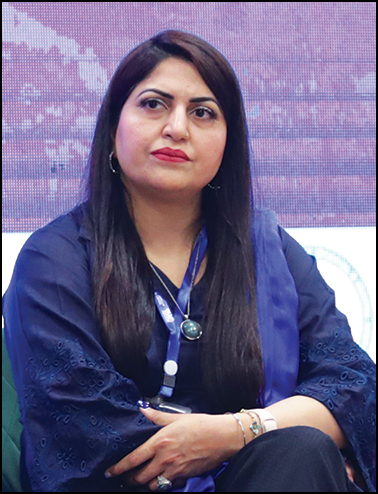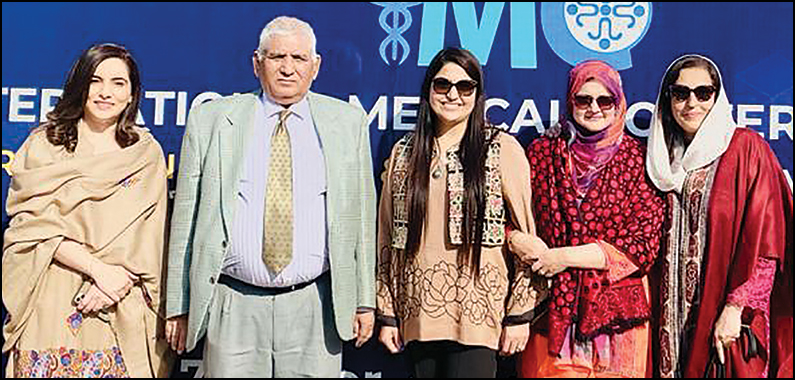Simulation should be integrated into traditional curriculum-Dr. Jabeen Fayaz
Artificial Intelligence can be effectively used for history taking
LAHORE: Dr. Jabeen Fayaz MD, FCPS, MHPE, PhD SIMKIDS Medical Director, Sick Kids The Hospital for Sick Children from University of Toronto Canada was one of the guest speakers at the recently held Internaitonal Medical Education Conference jointly organized by Superior University and University of Lahore in collaboration with Pakistan Association of Medical & Dental Institutions (PAMI) here from March 4th to March 8th2024. She conducted two days session at the Simulation Center established at University of Lahore on March 5th which was a part of the three months Certified Healthcare Simulation Professional Certificate course by University of Lahore. She visited the Superior University on March 6th 2024 and conducted the workshop on Simulation which was very well attended. An interesting aspect of her workshop was that she made things so simple that she was able to convey the message effectively which the participants thoroughly enjoyed.

Dr. Jabeen Fayaz
In her presentation Dr. Jabeen Fayaz pointed out that Simulation is a technique and not technology to replace real experiences with guided examples that replicate substantial aspects of real world in interactive manner. Task trainers, she opined, are cost effective way of replication of skills. Speaking about simulated persons, she said, anybody can be trained. Task trainers are low cost while Manikins can be expensive and one might have to replace some parts. She then discussed in detail the simulation based learning activity. This, she said, allows to develop or enhance knowledge and skills, attitude can be analyzed and respond to realistic situational environment. She suggested that one must have the healthcare simulation dictionary to understand everything. She then defined the healthcare standards of best practice and laid emphasis on professional integrity. The four basic standards she stated are Pre Briefing, Simulation, Design facilitation and De-briefing. One should know where to use it, then arrange manikins while monitors should also be ordered together.

She also discussed about established teaching outcomes, the types of simulators that best matches the objective and does one need to immerse the learners with the practical skills? One should use these simulators because they are risk free and one can engage the learners in this environment. One can learn from the mistakes, enhance learning and work in collaboration. Start from individual to team work, know how to communicate inter professional collaboration. Observe closely, help learners to create new knowledge. She also referred to experiential learning i.e. safe learning environment. She suggested integration of simulation into traditional curriculum.

Dr. Jabeen Fayaz from Toronto Univesity who was one of the guest
speakers during the IMC 2024 photographed alongwith some of the
participants of IMC 2024 at University of Lahore campus.
It is a bridge not substitute of patient experiences. One should dream big, start working, start gradually and then move forward. Find resources, take baby steps. She also talked about high fidelity and low fidelity Manikins. Educators, Dr Jabeen Fayaz stated should be trained. Acquire the services of Sim Technologists and investment in human resources is extremely important.

In next part of her presentation Dr. Jabeen Fayaz pointed out that breaking bad news is not possible with Mankins but simulated patients. Artificial Intelligence can be best used for history taking. New generation of students, she further stated is very smart to adopt new learning methodology. One should embrace problems and continue to work. Talking about which technology and how to adopt it, she said, AI now also include emotional intelligence. New generations show emotions differently. Develop empathy. There is always another way than Right or Wrong way. She then shared the details of various simulation based programmes. Programme, she opined, is more important than a facility, hence it is better to think of a programme. She then talked about need assessment, identify the stakeholders, look at current resources and facilities and then determine training objectives. She also discussed how to design and set up a training programme.
It should be aligned with current curriculum, incorporate interdisciplinary training. We as doctors do not know how much attention the nurses and technicians pay and contribute to healthcare. We must learn to respect the nurses and related support technical staff, she remarked. Try to understand how physiology converts into pathology. We have isolated knowledge and there is no linkage in our set up. In the next part of her presentation she discussed at length staffing and training, operational policies, procedures, budgeting and resource allocation and total cost of establishing a simulation facility.
Proper allocation of facility, allocation of funds for equipment and technology, monitoring and adjusting budget is needed. At times administration, Dr. Jabeen Fayaz said, has to take difficult choices. She also referred to marketing and outreach programme. At present simulation, she stated, is being done at many centers in Pakistan. She emphasized the importance of collaboration between different centers. We established the Sim Kid Center in 2023. De briefing is not teaching but conversation. Weeklong training is necessary for debriefing. Sharing the details of facilities available at their simulation center, she said, we have assessment room with audiovisual facilities. Then there is a control room from where one can observe students, there is a procedure room.
Our Simulation programme Dr. Jabeen Fayaz said that is an ever expanding, diverse, collaborative program. It was initially accredited by the Royal College of Physicians and Surgeons of Canada in 2013 and most recently renewed in 2023. The Simulation program supports over 5,600 learners and facilitates more than 24,400 learner hours each year. The programme includes Procedural skills training, Individual and team training for clinical and non-clinical learners, Simulation research and International teaching.
She then referred to simulation, task trainers and 3D printing. Research and publications, she remarked are extremely important. She laid emphasis on recognition of all those who are doing some amazing work. People she said, can come for doing electives to our center. We are now running a certificate course in simulation. In the next session she discussed clinical utilization.



